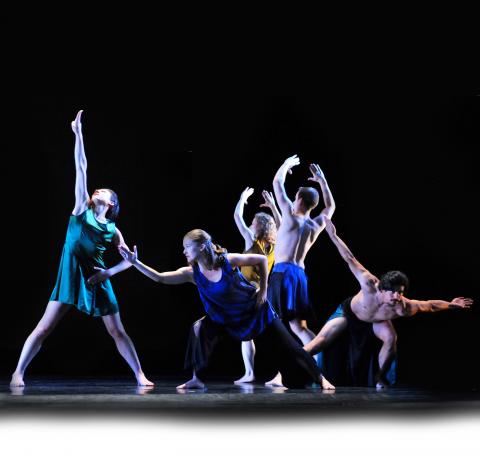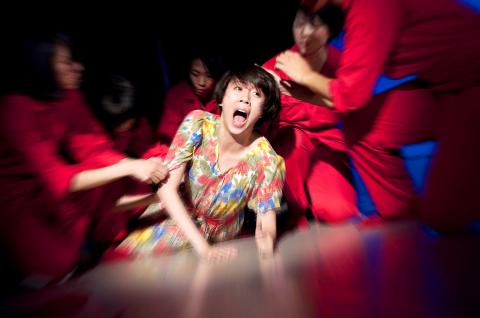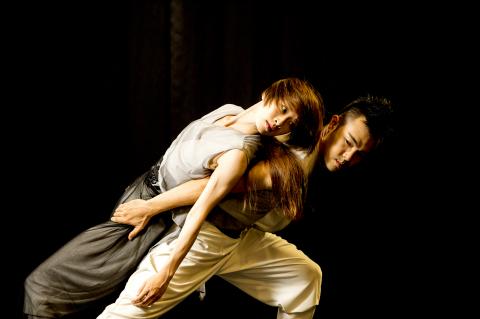This is the kind of weekend that gives dance lovers nightmares about empty wallets. Too much choice, too little time. However, with careful budgeting of schedules and money, it is possible to see all three terrific groups that are performing in Taipei today and tomorrow.
First up is one of the US’ — and the world’s — top contemporary troupes, the Mark Morris Dance Group, which will be making its Taiwan premiere.
The promoter, the Management of New Arts, has brought the troupe and its music ensemble to Taiwan for performances in Taipei as well as at the Tainan Arts Festival in Greater Tainan. It is quite a coup, because the company is one of the best modern troupes in the world and Morris himself has helped redefine both ballet and contemporary dance as few of his contemporaries have. It is hard to understand why it has taken this long to get the company here.

Photo: Mandy Cheng, AFP
It is hard to believe the Brooklyn, New York-based troupe is now 34 years old and its founder is 58; it seems just yesterday that one could not read about Morris without seeing the words “enfant terrible of dance” somewhere close by.
Morris, who performed with companies as diverse as Lars Lubovitch and Eliot Feld before branching off on his own, has blossomed into a renaissance man in recent decades. In addition to creating ballets for companies worldwide and working for many years with Mikhail Baryshnikov on the White Oak Project, he has added conducting to his list of achievements as well as directing and choreographing operas.
The company has brought two separate programs, A and B, each featuring three works, that give a broad overview of Morris’ style and technique. Program A (Eleven, Double and Grand Duo) was performed on Thursday and Friday in Taipei and will be seen again in Greater Tainan on Thursday night.

Photo courtesy of Liu Ren-haur / Scarecrow Contemporary Dance Company
Tonight and tomorrow sees program B at the National Theater, to be repeated on Friday in Greater Tainan: All Fours, Crosswalk and Festival Dance.
All Fours, from 2003, is set to Bela Bartok’s String Quartet No. 4 in C Major, Op. 91. The almost brand-new group piece Crosswalk, which premiered last year with all its clashes and interminglings, is set to Carl Maria von Weber’s Grand Duo Concertant, for Clarinet and Piano, Op. 48, while Festival Dance, from 2011, set to Johann Nepomuk Hummel’s Piano Trio No. 5 in E Major, Op. 83.
There are still tickets left in several price categories for tonight and tomorrow’s show in Taipei and the two in Greater Tainan. They are pricey — but well worth it.

Photo courtesy of Jade & Artists Dance Troupe
Meanwhile, upstairs in the National Theater complex, the Greater Tainan-based Scarecrow Contemporary Dance Company (稻草人現代舞蹈團) is performing its latest production, Singular (單‧身) in the Experimental Theater.
The company, which is marking its 25th anniversary this year, is going strong under the leadership of choreographer Luo Wen-jinn (羅文瑾), who became artistic director in 1998.
Scarecrow is known for producing thought-provoking works — by Luo and others — that continue to raise questions in the audience’s minds long after they have left the theater.
Luo’s own works are based on astute observations of modern society and life in Taiwan, often centered on the conflicts between individuals and family, solitude and urban life, the impact mental stress can have on the physical.
The company says the latest work was inspired by Paul Auster's book, The Invention of Solitude, as well as the tenuous space that exists between reality and nonentity and the eternal question of existence. Set on eight dancers, Singular is an exploration of eight stages of life as seen by a lonely woman, an outsider, an abandoned love child, a forlorn mother.
Across town at the Metropolitan Hall, the Shilin-based Jade & Artists Dance Troupe is performing the third chapter of its “Catch of the Glimpses” program, Action Without Action (捕風捉影Ⅲ─無為).
This is the third installment of series that began with Catch of the Glimpses in 2004, an exploration of martial art as well as traditional Chinese and contemporary dance movements.
For Action Without Action, the group’s artistic director and choreographer, Jade Hsu (華碧玉), invited Lin Hui-kuan (林慧寬), a pipa (琵琶) player from Chai Found Music Workshop (采風樂坊) and drummers from Mobius Strip Theatre (莫比斯圓環創作公社) to perform with her troupe.
Hsu turned to the central tenets of Taoism for inspiration for her latest work, the idea of doing without trying to do. The dance is a dialogue between tradition and modernity, using the tension and repose of modern dance and martial arts to interpret Laozi (老子), the founder of Taoism, philosophy.
The show runs 90 minutes, including a 15-minute intermission.
This story has been corrected since it was first published.
Dance Notes
WHAT: Mark Morris Dance Group
WHEN: Tonight at 7:30pm, tomorrow at 3:30pm
WHERE: National Theater (國家戲劇院), 21-1 Zhongshan S Rd, Taipei City (台北市中山南路21-1號)
ADMISSION: NT$1,200 TO NT$3,600; available at ERA ticketing booths, online at www.ticketing.com.tw and at 7-Eleven ibon kiosks and other convenience store ticket kiosks
ADDITIONAL PERFORMANCES: As part of the Tainan Arts Festival, the company will be performing Program A on Thursday, June 19, and Program B on Friday, June 20, at the Tainan Municipal Cultural Center (臺南文化中心演藝廳), 332, Chunghua East Rd Sec 3, Greater Tainan (臺南市中華東路3段332號); tickets priced and available as above.
WHAT: Action Without Action
WHEN: Today at 7:30pm, tomorrow at 2:30pm
WHERE: Metropolitan Hall (城市舞台), 25, Bade Rd Sec 3, Taipei City (台北市八德路三段 25號)
ADMISSION: NT$400 to NT$2,500; available at door, NTCH box offices, online at www.artsticket.com.tw and at 7-Eleven ibon and other convenience store kiosks
WHAT: Singular
WHEN: Today at 2:30pm and 7:30pm, tomorrow at 2:30pm
WHERE: Experimental Theater (國家實驗劇場), 21-1 Zhongshan S Rd, Taipei City (台北市中山南路21-1號)
ADMISSION: Tickets are NT$500, available at NTCH box office, online at www.artsticket.com and at 7-Eleven ibon and other convenience store kiosks

In Taiwan there are two economies: the shiny high tech export economy epitomized by Taiwan Semiconductor Manufacturing Co (TSMC, 台積電) and its outsized effect on global supply chains, and the domestic economy, driven by construction and powered by flows of gravel, sand and government contracts. The latter supports the former: we can have an economy without TSMC, but we can’t have one without construction. The labor shortage has heavily impacted public construction in Taiwan. For example, the first phase of the MRT Wanda Line in Taipei, originally slated for next year, has been pushed back to 2027. The government

July 22 to July 28 The Love River’s (愛河) four-decade run as the host of Kaohsiung’s annual dragon boat races came to an abrupt end in 1971 — the once pristine waterway had become too polluted. The 1970 event was infamous for the putrid stench permeating the air, exacerbated by contestants splashing water and sludge onto the shore and even the onlookers. The relocation of the festivities officially marked the “death” of the river, whose condition had rapidly deteriorated during the previous decade. The myriad factories upstream were only partly to blame; as Kaohsiung’s population boomed in the 1960s, all household

Allegations of corruption against three heavyweight politicians from the three major parties are big in the news now. On Wednesday, prosecutors indicted Hsinchu County Commissioner Yang Wen-ke (楊文科) of the Chinese Nationalist Party (KMT), a judgment is expected this week in the case involving Hsinchu Mayor Ann Kao (高虹安) of the Taiwan People’s Party (TPP) and former deputy premier and Taoyuan Mayor Cheng Wen-tsan (鄭文燦) of the Democratic Progressive Party (DPP) is being held incommunicado in prison. Unlike the other two cases, Cheng’s case has generated considerable speculation, rumors, suspicions and conspiracy theories from both the pan-blue and pan-green camps.

Stepping inside Waley Art (水谷藝術) in Taipei’s historic Wanhua District (萬華區) one leaves the motorcycle growl and air-conditioner purr of the street and enters a very different sonic realm. Speakers hiss, machines whir and objects chime from all five floors of the shophouse-turned- contemporary art gallery (including the basement). “It’s a bit of a metaphor, the stacking of gallery floors is like the layering of sounds,” observes Australian conceptual artist Samuel Beilby, whose audio installation HZ & Machinic Paragenesis occupies the ground floor of the gallery space. He’s not wrong. Put ‘em in a Box (我們把它都裝在一個盒子裡), which runs until Aug. 18, invites